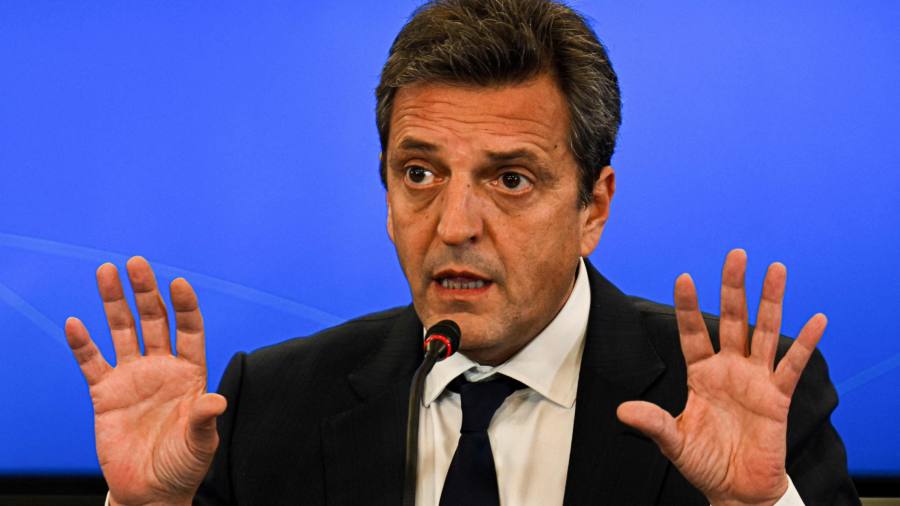Receive free Argentina updates
We’ll send you a myFT Daily Digest email rounding up the latest Argentina news every morning.
Argentina’s ruling Peronist coalition announced on Friday that it would unite behind economy minister Sergio Massa as its sole candidate for October’s presidential election, betting that he can overcome inflation running at more than 114 per cent a year and a deepening financial crisis to beat the rightwing opposition.
The surprise news came only a day after two other Peronist politicians, interior minister Wado de Pedro, an ally of the radical leftwing vice-president Cristina Fernández de Kirchner, and moderate Daniel Scioli, had said they would compete for the ruling party nomination.
Neither Fernández de Kirchner nor President Alberto Fernández, who both have high rejection rates among voters, intend to put themselves forward again in a compulsory nationwide primary in August which will finalise all party candidates before October’s election.
Massa, a pragmatist and skilled political operator given the economy post 10 months ago, faces an uphill struggle to convince Argentines that he would make the best president. The South American grain exporter is almost out of hard currency despite stringent foreign exchange controls and is heading for a recession this year.
Massa is attempting to persuade the IMF to speed up the release of funds from a $44bn loan programme agreed last year to stave off a devaluation of the officially controlled exchange rate. Argentina has failed to meet several IMF targets but is arguing that it deserves special treatment because a severe drought has hurt grain exports.
The Union for the Homeland, a Peronist umbrella group, announced in a tweet on Friday evening that it would field Massa as a unity candidate “out of institutional, political and social responsibility” and thanked de Pedro and Scioli for putting party unity before their own ambitions. The pro-Peronist labour confederation CGT quickly hailed the move.
There was no immediate comment from Massa, de Pedro or Scioli. Scioli had tweeted a campaign video of his own just two hours before the announcement of Massa as the unity candidate, suggesting that the move was a last-minute decision before Saturday’s deadline for registering candidates. Agustín Rossi, Fernández’s cabinet chief and former defence minister, will be Massa’s running mate.
The choice of Massa and Rossi and de Pedro’s withdrawal suggested a decline in the influence of Fernández de Kirchner, a former two-term president and icon of the Latin American left who had long held sway over the Peronist movement.
Opposition candidates were quick to scorn the ruling party’s choice of an economy minister presiding over an economic crisis as its presidential candidate. “The arsonist is putting himself forward as a fireman,” said Patricia Bullrich, one of the two leading candidates for the nomination of the centre-right Juntos por el Cambio (JxC) opposition movement.
Bullrich is competing for the JxC nomination against Buenos Aires mayor Horacio Rodríguez Larreta, a moderate who has sought to build bridges to some ruling party figures in a bid to unite the country.
Both the Peronists and the mainstream opposition face a serious challenge from hard-right economist Javier Milei, who hopes to pull off an upset with an insurgent campaign.
Sometimes described as an Argentine Bolsonaro, in reference to former Brazilian president Jair Bolsonaro, Milei’s diatribes against establishment politicians and his promises to dollarise the economy have resonated with Argentines tired of years of financial crises. Some polls suggest Milei may win more votes in the primaries than any other individual candidate.
Read the full article here




